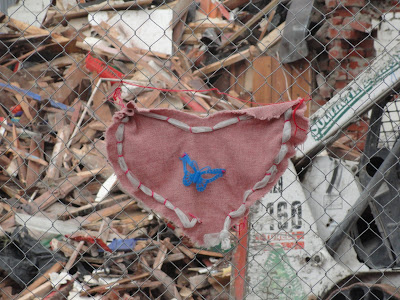But yesterday, for the first time, I sensed a change in mood. Little roadside stalls were popping up along Oxford Street. There were more people. They were talking not so much about the devastation as about the future. Conversations have turned to what could be. It seems that, as more and more historic buildings are demolished in London Street and Norwich Quay, the empty blocks - the spaces - are enabling new visions to emerge. I too feel this confidence. I know the residents of Lyttelton are strong enough, and sufficiently determined, to drive a rebuild that will meet their needs as a community.
One of the things that has concerned me, especially in the city, is that I will see empty spaces and wonder 'what was there?' - even in a city I know so well. However yesterday I noticed something different about the spaces. That you can look through. That they open up unexpected vistas. Obvious, yet unanticipated and strangely liberating. As though we need to be reminded that the absence of a building is a space and an opportunity. This parallels the many conversations I've had with friends and acquaintances about the post-quake, changed relationship with possessions. Items that we have treasured and lost seem unimportant in wider scheme of things. 'Stuff' is just stuff - and in times of emergency, a potential encumbrance. Perhaps we all feel lightened (literally and figuratively). Never could I, as someone who treasures objects and buildings with history and personal import, have imagined this possibility. It has taken a seismic shake to realign my/our relationship with the man-made environment.




































